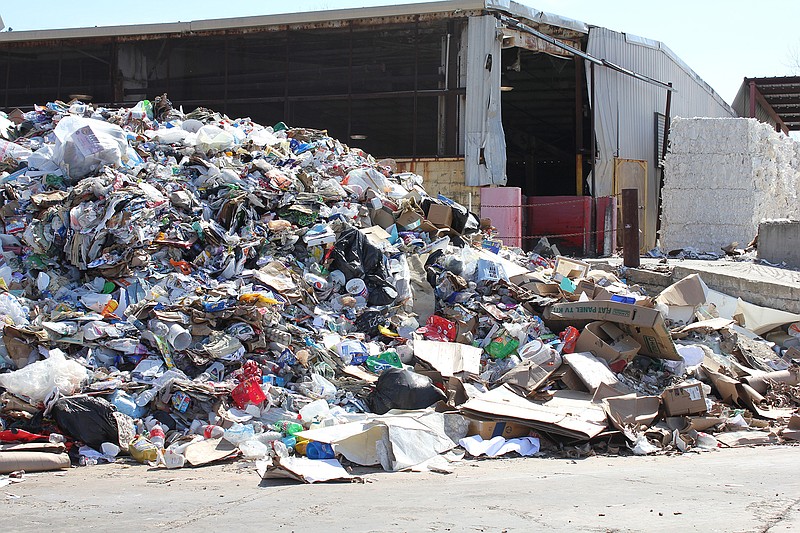SINGLE-STREAM (MIXED) RECYCLING GUIDELINES
Waste Management offers single-stream curbside recycling in Texarkana, Texas, and Arkansas-side residents can take advantage of single-stream recycling at the monthly Green Texarkana recycling drive. Waste Management collects recyclables weekly from residents' yellow-top bins. Green Texarkana takes place from 8 a.m. to 1 p.m. on the second Saturday of each month at East Third and Hazel streets downtown. DO flatten cardboard boxes. DO clean all traces of food from cans and containers. DO place plastic caps back on empty bottles. Caps once were not recyclable, but processing technology has improved. DON'T bother removing package labels. DON'T bag or bundle recyclables. They should be loose in the bin. DON'T put food waste, liquids or yard waste such as leaves and branches into recycling bins. DON'T put anything in the recycling bin you are not sure is recyclable. That could result in all of the bin's contents going into a landfill. Include Aluminum, iron, steel and tin cans Plastic containers with recycling numbers 1 through 7 Paper, newspaper, paperboard, cardboard and magazines Do Not Include Glass, porcelain or ceramics Plastic bags or film Unnumbered plastics Polystyrene foam (Styrofoam) Electronics or appliances Hazardous materials or medical waste ONLINE Waste Management's "Recycle Often Recycle Right" education campaign: r0rr.com Green Texarkana: arkansas.txkusa.org…Trade decisions made in China are affecting recycling efforts in Texarkana, reducing residents' options and prompting the waste industry to ask for help keeping costs down.
China-the world's No. 1 importer of recyclables-no longer accepts certain materials and has begun holding what it does buy to an extraordinary quality standard. The resulting market disruption has caused the city of Texarkana, Ark., to stop everyday collection of recyclable plastics and added urgency to local "recycle right" education campaigns.
"All of a sudden, the place where a third of our recyclables goes is saying, 'We don't want it anymore,'" said David Biderman, CEO of Maryland-based lobby the Solid Waste Association of North America.
The Chinese industrial boom of the 1990s caused a spike in the country's demand for all sorts of recyclable materials, which it imported with little regard to so-called contamination-dirty or unusable materials mixed with recyclable paper, metal and plastics.
"They were finding that they were getting 20, 25, 30 percent contamination, and then they were having to deal with land-filling that," said Doug Sim, a public sector solutions manager with Waste Management Inc.
Solid waste disposal has become so problematic there that China instituted a new set of import restrictions effective beginning Jan. 1. Twenty-four types of materials-including mixed paper and mixed plastics with recycling numbers 3 through 7-are banned from import. Contamination for any material imported into the country is limited to only 0.5 percent.
As a result, the Texarkana, Ark., Recycling Center has stopped accepting any plastics until the city can find a new buyer for them. The city's private-sector partners, however, will continue to accept plastics during the monthly Green Texarkana recycling drive.
Waste Management-which provides curbside, single-stream recycling on the Texas side-has shifted all of its recyclable plastics sales to processors within the United States, so it does not anticipate limiting what plastics it will accept.
"We're trying to continue as long as possible to accept everything that we've always accepted," Sim said, adding that future economics may make that impossible. "It may be at some point and time that we'll see a restricted plastics market, where we're not taking all the mixed plastics, we're taking 1's and 2's only."
China returns overcontaminated shipments to exporters such as Waste Management at their expense, and both Chinese and domestic processors pay less for contaminated materials. That means very careful sorting-both at curbside and at industry facilities-is essential to keeping costs down.
It is possible that the cost of contamination will eventually show up in Texas-side residents' sanitation bills.
"We could go to the city, ostensibly, and say our cost of profit in this material has increased so much we're requesting an increase. We've never done that, but it's possible that that could happen. Or at the end of the five-year contract, when you renegotiate, obviously you have to make up for that loss, and you end up charging more," Sim said.
Residents can help by only putting acceptable materials in their recycling bins and making sure those materials are "perfectly clean," Waste Management Communications Manager Greta Calvery said.
"People will say, 'I don't have to get my peanut butter jar totally clean, do I?' And I'm going, 'Oh, absolutely,'" she said. "The material needs to be clean and dry. If it's got any food or anything, it's going to contaminate the rest of the process," she said.
Under the circumstances, the industry considers education campaigns such as Waste Management's "Recycle Often Recycle Right" program, which seeks to teach recyclers what to put in and what to leave out of their bins, are more important than ever.
"It's in the best interest of Waste Management and of the consumer or the resident to keep as clean material as possible in the recycling bin," Sim said.
On Twitter: @RealKarlRichter

